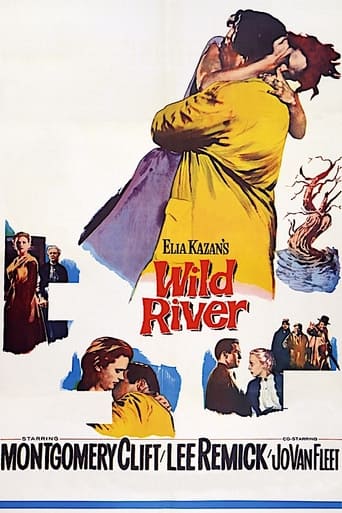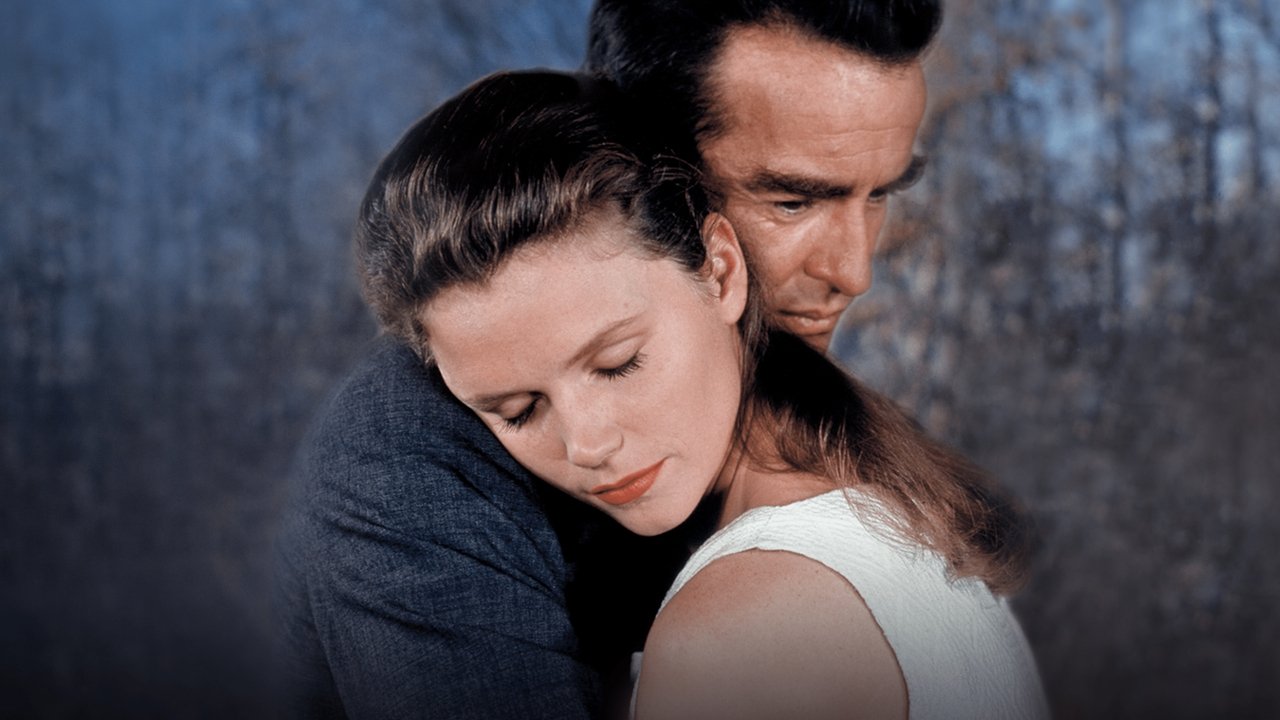PimpinAinttEasy
Dear Arundhati Roy,I know you hate dams. And love the idea of people living off the land. I was thinking about you while I was watching this film. It is an elegy for the old ways of life. I am sure you would appreciate the beautiful scenery filled with leafless branches of trees, thickets, grounds covered by leaves and the rivers. You would certainly admire the spirit of the old lady (Jo Van Fleet) who staunchly refuses to move an inch for the forces of progress. You might even appreciate the very believable Government man (Montgomery Clift) who is conflicted about his role in removing the old lady from the land. Lee Remick's earthy beauty would be hard for anyone to ignore. The plight of the helpless serfs who can only look on when their old master is forced out only for new masters to take over would certainly interest you. The one dimensional and silly portrayal of the paranoid Southern American white folk might appeal to you because it is just like your often one dimensional portrayal of people and things that you do not like.Though I am not sure whether you would appreciate the lack of sarcasm in the movie's final scene. I did feel like there was a hint of ambiguity when Clift and Remick looked away from the old lady's land (now almost completely drowned out by the water from the dam) and admired the dam. Elia Kazan while celebrating rugged American individualism was also saying that ultimately progress was the only way forward.Best Regards, Pimpin.(8/10)
weezeralfalfa
Very much reminds me , in it's basic theme and plot, of the much older film "Trail of the Lonesome Pine", shot in pioneer 3 strip Technicolor, in 1936. Both involve the sudden intrusion of the federal government or a large corporation into a primitive backwoods Appalachian community, with promises of much bettering their lives by the exploitation of some local natural resource other than farm land or forests. Both involve a budding romantic relationship between the chief spokesman for the agency and a beautiful young woman in the community. Both include a sacrificial local victim or two, related to the initiation of the project. However, in the earlier film, the community had a choice whether or not to allow this intrusion, whereas in the present film, the government can't take no for an answer...This film also brings up memories of "The Grapes of Wrath", in that the community or extended family is forced to move. As in the present film, this move is much harder on and more resisted by the grandparent generation than the grandchildren generation. The present film involves more introspection than these former films. This is a strength of Montgomery Clift: the male lead. Unlike a few reviewers, I found Monty generally good in his role, if lacking the warmth of his counterpart in the earlier film: Fred McMurray. He appeared to have good romantic chemistry with Lee Remick. However, his character is conflicted about whether it's a good idea for either to marry her, thus he often holds back.There are 2 primary issues to the plot, along with an induced third issue. Issue #1: Can TVA field administrator Chuck(Monte) convince stubborn matriarchal grandma Ella and her loyal entourage to vacate her island kingdom before the Tennessee river behind the new dam begins to rise, to eventually flood this island? Or will she and the others have to be forcibly removed? Issue #2: Whether grandma's beautiful young widowed granddaughter(Lee Remick, as Carol), with her 2 kids, will marry her local middle-aged boyfriend: Walter, or Monte? I'd like to delve into the second issue first.Although Carol initially sides with grandma in her hostility toward Monte, as a TVA rep, she soon begins to warm up to him, as she faced the reality that she will soon have to leave this island. She finds Monte a better romantic prospect than Walter. Also, he promises to provide a ticket to a new kind of life, far from his community. At times, Monte encourages this dream. But when Carol asks for a definite commitment, he balks. We don't understand why. Does he have a girlfriend or wife? Is he 'not the marrying kind'? Is he afraid that Carol would not be accepted socially by his friends, with her backwoods background? But, later that night, he changes his mind, after Carol joins him in trying to beat off an ugly mob that has come to intimidate him into leaving that area for good. Seems like it's usually raining when these 2 are together in a house or car, This helped provide a more intimate atmosphere..The relationship between Walter and Monte is curious. Walter doesn't seem very upset that Monte has suddenly appeared as a new rival. In fact, he and Monte get drunk together, then go to grandma's house to, once again, try to convince her to leave. Later, when Walter arrives with the mob come to chase Monte out of the area, he changes sides, entering the house to help Monte and Carol to beat off the mob. All together, it looks like Walter is more like a friend and protector of Carol than a serious lover, and he accepts that status.I assume the title refers to the river in its destructive flood stage, and also to how grandma wants the river to remain. She states that she believes that nature should be left undisturbed. Yet, she and her husband vastly altered the landscape of her island ,as Monte fails to point out. She's not interested in having access to electricity from the dam. Carol correctly predicts that grandma won't long survive leaving her island. Presumably, she simply wills her death, almost immediately after she moves to her TVA-financed new home.... Monte's boss initially tells him he doesn't want grandma and the others forcibly removed, if possible, But when the flood waters are ready to rise, he changes his mind as he definitely doesn't want grandma or any others to become a martyr by staying and drowning. By then ,nearly all the others had left the island, and accepted the TVA terms. However, Sam, an old African American, refused to leave ahead of grandma, even when she insisted. Earlier, he refused to sell her his old dog at any price. Thus, he represents another old person set in his ways, refusing to act on the reality that his home would soon disappear under water. Clearly, the many African Americans(AA) living on this island were satisfied with their lives. Ditto grandma's several sons on the island. One claims he never has to work here. Presumably, the AAs did all the heavy labor, thus he could spend his time lazing around with his fishing rod.Monte has another group angry with him. He's hiring local AAs to work on TVA projects for $5.00 a day, the same as for white men. The usual wage for AAs here is $2.00/day, less than for whites. Monte refuses to make a difference in payment based on race. Thus, many of the AA hired help of local farmers are leaving for the better paying job, or the land owners are forced to pay them more to keep them. This is the reason for the mob destroying his car and damaging Carol's house they are in.
rbredmond1
"Wild River" was released in 1960. I would have been 13 then and this movie is still strong in my now 67-year old mind. It was filled with tragedy and heartbreak, the destruction of past and future and hope. Shortly after the old woman left the island, her homestead on it covered over with water, covering her past like it had never occurred, and because she died in the fancy new house the TVA had made for her shortly after she got there, it was like she'd never been - like it had all been mist and shadows. That's stuck in my mind for most of my life, with a lesson that nothing is forever. "To every thing there is a season, and a time to every purpose under the heaven..." Eccl 3:1(KJV) AMEN!!!
dougdoepke
Not many movies out there are about the TVA. But this one is, and it's both entertaining and educational. The Tennessee Valley Authority was part of the Depression Era New Deal. It both put unemployed men to work and built a system of dam driven turbines that furnished electricity to much of the South. The trouble is that it required taking over the land affected by the new waterways and moving off the owners. Despite offering compensation to the owners, many didn't want to leave. Here, old lady Garth (Van Fleet) refuses to leave and by golly no one's going to make her, including government man Glover (Clift). How he eases her off the land without using force forms the crux of the plot.Filming in Tennessee in Technicolor is a real asset, lending both eye appeal and authenticity. I also like the way the movie deals with social issues of the time. Blacks as well as Whites are hired onto the same TVA work teams and paid the same wages. That upsets both local segregation laws and the local economy since Blacks are customarily paid a fraction of what Whites get. Naturally many Blacks leave their former jobs to hire on with the better paying government work force. This angers many local Whites who then try to disrupt the project. Thus, federal man Glover has a lot to contend with, especially since he's also romancing old lady Garth's unhappy granddaughter, Carol (Remick).Van Fleet's excellent as the hard-bitten matriarch, and so is Salmi as one of the local thugs. Surprisingly, Remick's usual sexy appearance is downplayed in favor of a more emotive role. But to me, the real surprise is Clift. He's mostly expressionless throughout the 100-minutes. I suspect that's because of the auto accident that so damaged his face several years earlier. But, whatever the reason, he's not nearly as effective as we know he could be from earlier films.This may not be one of director Kazan's more celebrated showcases, but it is both an intriguing drama and a revealing look at an important slice of American history.



 AD
AD



